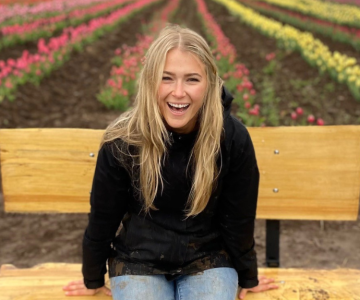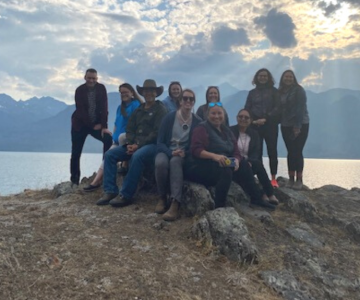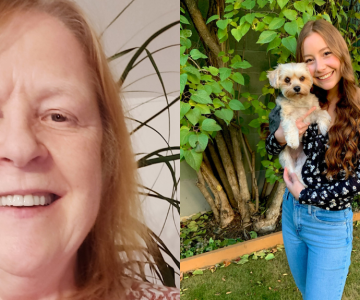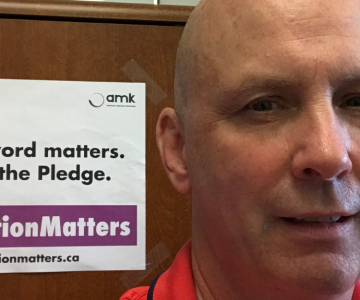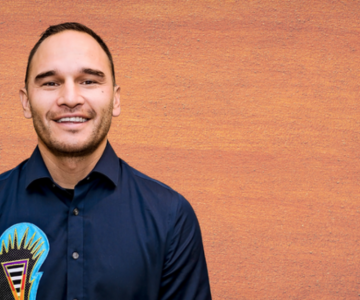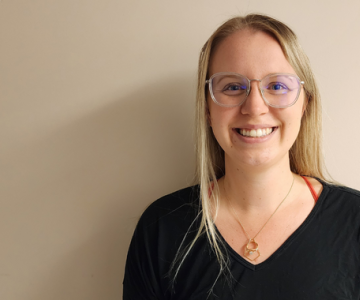Breadcrumb
Explore Stories
Community & Culture
Name: Renee Faubert (she/her/hers)Job Title: Clinical Respiratory Educator (Registered Respiratory Therapist, or RRT)Years of Service: 5.5Worksite: Kelowna General HospitalCommunity: KelownaAncestral Territory: Syilx OkanaganFavourite Quote / Advice to live by: It is what it is.
Renee Faubert’s goal as Kelowna General Hospital’s (KGH’s) respiratory therapy (RT) educator is to ensure Interior Health delivers the best respiratory care to all patients, but especially pediatric patients. Registered respiratory therapists (RRTs) are certified medical professionals who treat problems with a patient's lungs or breathing. RRTs work closely with doctors to diagnose and monitor a patient's condition.
Renee keeps her colleagues up to date with the latest medical evidence, shows them how to use the latest respiratory equipment and serves as a resource in complex cases.
“I’m involved with respiratory therapy education related to ventilation in the ICU, tracheostomy education on wards, and I’m available to all KGH staff who have respiratory-related questions,” says Renee.
Most of her career has been spent in pediatrics and neonates (newborns). She has been involved with many pediatric regional policies, educational opportunities and presentations. Renee is a Pediatric Advanced Life Support and Basic Life Support instructor, and takes pride in sharing her respiratory knowledge of pediatrics to other specialties.
Community & Culture
How do health and wellness leaders gain perspective on the health challenges faced by rural and remote communities? They make time to visit with the people who live there, listen to their stories, and build meaningful relationships.
Recently, the Xeni Gwet’in First Nation hosted a meeting of the Partnership Accord Leadership Table (PALT), a regional table comprised of the seven Interior Region First Nation Executives, Interior Health board and senior executive team members, and First Nation Health Authority (FNHA) executives. PALT meets quarterly to strategize and make decisions around the health and wellness needs of First Nations peoples.
The meeting marked the first time that PALT met outside of a large urban centre, reflecting a decision by representatives to hold every second meeting in a First Nation community within the Interior region. Given that half of Aboriginal populations live in rural and remote communities across the Interior, this decision provides valuable first-hand insight into the unique challenges they experience.
Salmon wash ashore at Chilko Lake.Xeni Gwet’in is one of six communities within the Tsilhqot’in Nation, located approximately 200 kilometres west of Williams Lake. The community is nestled in a remote valley surrounded by coastal mountains. Glacier-fed lakes and rivers provide important salmon grounds. Approximately 150 Tsilhqot'in deni (people) live within the territory; an additional 250 community members live across colonial Canada.
One challenge faced by rural and remote communities such as Xeni Gwet’in is the logistics of travel. Located three hours by car from Williams Lake and eight hours from Kelowna, the final 100 kilometres approach is gravel road. Car issues such as blowouts are not uncommon. With no repair shops nearby, both collaboration and self-sufficiency are crucial. Health-care service delivery in rural and remote areas requires innovative approaches, such as an increased reliance on digital health services to meet these challenges.
Several members of the Interior Health delegation arrived at Xeni Gwet’in with flat tires and were grateful for help provided by community members to patch them up. Dr. Doug Cochrane, the IH Board Chair, and Addie Pryce, Vice President for Aboriginal Partnerships, (pictured above) were also temporarily sidelined on their return trip with a flat.Another challenge facing many rural, remote and Aboriginal communities is water quality. Unsafe drinking water has serious, long-ranging health effects. At the time of the PALT meeting, only half of the community had access to clean, drinkable water. A major project is underway in the community to ensure that drinking water is available to all.
The opportunity to travel into Xeni Gwet’in provided valuable learning experiences, including a deeper understanding of the challenges faced by many First Nations in caring for their people, one of them being equitable access to health care.
Community & Culture
Health care assistants (HCAs) make a tremendous difference in our lives. HCAs may have many different job titles, including:
Community Health Worker
Residential Care Aide
Home Support Worker
Long-Term Care Aide
Home Health Aide
Continuing Care Assistant
Personal Care Aide
The one thing all HCAs have in common is that they provide frontline personal care and assistance services to vulnerable patients, clients and residents.
Meet two of our HCAs at Interior Health.
Community & Culture
Excerpts reprinted with permission from Here to Help. Read the full article.
In 1885, Wilhelm Röntgen discovered X-rays - and saw his skeleton. He began to work in private in case he ruined his reputation with such fantastical claims. Discoveries from Henri Becquerel and Marie Curie further uncovered ionizing radiation and the role it could play in health diagnostics and treatment. And just like today, misinformation and quackery spread alongside these advances in physics.
Radioactive quacks weren’t the first to spread misinformation, and they certainly won’t be the last. After the World Health Organization declared a Covid-19 pandemic in 2020, they declared an “infodemic”—an exponential increase in information, some reliable and some not, fuelling rumours, assumptions, conspiracy theories and disinformation. Disinformation, misinformation and fake news continue to threaten everyone’s health and well-being.
Health & Wellness
I was born and raised in Kelowna, the heart of B.C.’s Okanagan valley, which is well known for beautiful vistas and its wine industry.
People travel from all over the world to experience the vast selection of award-winning wineries in B.C.’s premier grape growing region. As a result, the region’s wine tourism industry brings in millions of dollars a year in revenue and provides thousands of full-time jobs as well as seasonal employment.
More recently, a boom of microbreweries, cideries and distilleries has made more unique and varied alcoholic beverages available to both tourists and locals alike. The Interior region’s rate of manufacturer liquor licences is more than three times higher than the provincial rate. According to Interior Health’s 2020 Medical Health Officer Report, from 2007 to 2018 the region had the highest per capita rate of alcohol consumption in B.C. and alcohol-related hospitalizations and deaths are higher than the provincial average.
Community & Culture
Name: Mike Adams (he/him/his)Job Title: Team Leader, Healthy Community DevelopmentYears of Service: 30Worksite: Vernon Health CentreCommunity: Head of Okanagan Lake, briefly known in time as VernonAncestral Territory: Syilx OkanaganAdvice to live by:
“If you're not having fun and laughing, then it's time to move on.”
“People. Helping people, supporting people, working with people.”
As an environmental health officer, Mike Adams’ passion is for making communities healthier places to live, learn, work and play. His goal is that everyone in the community has an equal opportunity to have the best life they want.
Research & Innovation
More and more, people are addressing their health-care needs virtually. But what if you have trouble with the virtual care options themselves?
The Interior Health (IH) Digital Health Support Desk helps people, caregivers and their families use and navigate IH virtual and digital tools to better manage their health care. IH launched the Digital Health Support Desk in spring 2022 to streamline the support process for patients and their families.
The Digital Health Support Desk team is available a t 1-844-870-4756, seven days a week. Here’s an overview of the support services offered:
MyHealthPortal
MyHealthPortal is an online platform that provides patients with secure 24-7 access to personal health information from a computer, tablet or smartphone. The Digital Health Support team can help with password/login ID resets, enrolments, proxy requests and more.
Online lab booking
The Digital Health Support team can help with booking or rescheduling an outpatient lab appointment or blood test and general account maintenance.
COVID-19 PCR test appointment bookings
As of Sept. 26, COVID-19 PCR testing appointment bookings are also supported if you need to book an appointment for a PCR test. An important thing to note is that eligibility for a PCR test is assessed using the COVID-19 Self-Assessment Tool prior to booking.
The PCR test is an accurate and reliable test for diagnosing COVID-19 and takes place at various sites in IH. You can make an appointment by calling the Digital Health Support Desk.
Zoom virtual visits
Do you have virtual visits with your care provider? The Digital Health Support team can help you download the Zoom videoconferencing app, set up a test Zoom visit, or help troubleshoot any other Zoom technical issues you may be having.
Contact options:
The Digital Health Support Desk is available seven days a week at 1-844-870-4756. Be sure to have your care card or BC Services card handy.
Monday to Friday: 7 a.m. – 7 p.m. PST
Saturday and Sunday: 8 a.m. – 4 p.m. PST
Statutory holidays: 10 a.m. – 2 p.m. PST
At any time, you can email DHSupportDesk@interiorhealth.ca with your support questions or submit via an online form. These requests are typically responded to within 24 business hours. Or, if you need help navigating to the right information on the IH website, the Digital Health Support Assistant chatbot can help point you in the right direction.
Community & Culture
It is now recognized nationally, marked by the colour orange. But Orange Shirt Day has deep-seated meaning for Kukpi7 (Chief) Willie Sellars of the Williams Lake First Nation (WLFN) – because its roots are entwined with the horrific history of the St. Joseph Mission (SJM) and Canada’s dark legacy of residential schools.
Many children from WLFN, along with children from Ulkatcho First Nation, Mt. Currie First Nation and other First Nations communities were forced to attend St. Joseph Mission (SJM) Residential School. Their stories, and the stories of children who attended residential schools across Canada, are now being told – and remembered every year on Sept. 30, now known as Orange Shirt Day and the National Day for Truth and Reconciliation.
Chief Sellars recently discussed the Sept. 30 days of recognition on Interior Health’s Interior Voices podcast.
"Intergenerational trauma is a real thing," he says. "What are we doing to address the intergenerational piece, break the cycle and start seeing healthier families and communities?"
Community & Culture
Name: Madison Waddington (she/her/hers)Job Title: Ultrasound TechnologistYears of Service: 10Worksite: Royal Inland HospitalCommunity: KamloopsAncestral Territory: Secwepemc / Shuswap Interior SalishAdvice to live by: Live your life to the fullest; we are not guaranteed tomorrow.
Madison Waddington is an outgoing, energetic ultrasound technologist. She works at Royal Inland Hospital (RIH) in Kamloops, the city where she was born and raised.
“I first got into the medical field because I was following in my dad’s footsteps to become an X-ray technician.”
-
Load More
Showing 405 of 786
Sign up for email updates
Receive news, alerts, public service announcements and articles right to your inbox.


